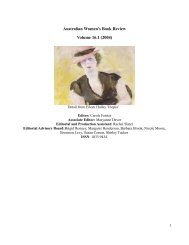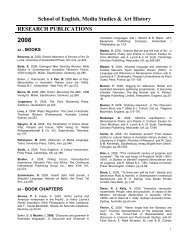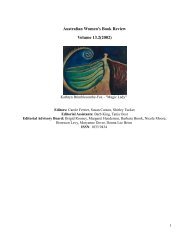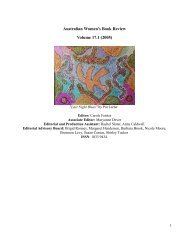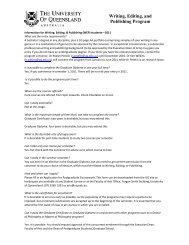Australian Women's Book Review Volume 14.1 - School of English ...
Australian Women's Book Review Volume 14.1 - School of English ...
Australian Women's Book Review Volume 14.1 - School of English ...
You also want an ePaper? Increase the reach of your titles
YUMPU automatically turns print PDFs into web optimized ePapers that Google loves.
arises through a principle <strong>of</strong> inclusiveness. McDonald's account <strong>of</strong> contemporary art tends to suggest an<br />
'all-over' style <strong>of</strong> feminism (or postfeminism), a feminism which - with its re-enactments, its parodies,<br />
and its alliances (appropriative or otherwise) with a range <strong>of</strong> theoretical, social and political concerns -<br />
seems to be less and less interested in questions <strong>of</strong> sexual difference. One <strong>of</strong> the issues that McDonald<br />
does not pursue here is whether Butler's view <strong>of</strong> gender as something constructed is adequate. Yet if<br />
femininity is just a social and historical construction, why haven't these enactments - which began a<br />
long time ago - liberated us from it? Why do so many women hold on to markers <strong>of</strong> femininity -<br />
markers which seem not only to survive but to thrive on these forms <strong>of</strong> parody?<br />
The questions <strong>of</strong> why and how lines <strong>of</strong> division between male and female, masculine and feminine,<br />
continue to matter in contemporary culture seem strangely peripheral to McDonald's account <strong>of</strong> the role<br />
<strong>of</strong> feminism in contemporary art. This is perhaps because these questions resist explanation in terms <strong>of</strong><br />
appeals to notions <strong>of</strong> ambiguity and the 'blurring <strong>of</strong> boundaries', notions which guide McDonald's<br />
discussion here. These difficult questions perhaps require a more incisive form <strong>of</strong> analysis than<br />
McDonald's pluralist feminism is able to <strong>of</strong>fer. Yet her book is important, not only because it may<br />
prompt us to reconsider the political stakes and limits <strong>of</strong> this pluralism, but precisely because it leaves<br />
more questions than it answers. What kind <strong>of</strong> erotic ambiguity is promised by the current<br />
'democratisation' <strong>of</strong> gender and sexuality? What kinds <strong>of</strong> differences resist this democratisation?<br />
Morgan Thomas lectures in art history in the <strong>School</strong> <strong>of</strong> <strong>English</strong>, Media Studies and Art History at<br />
the University <strong>of</strong> Queensland.<br />
33



